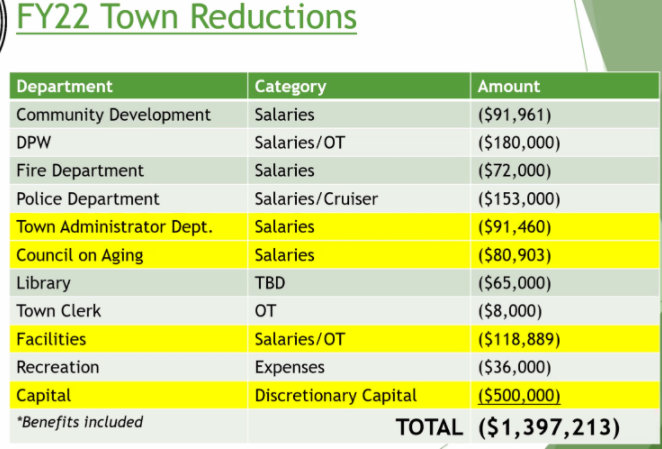Photo:
The date: April 6, 2021. The time: 9(-ish) p.m. The location: Belmont Town Hall. Town Clerk Ellen Cushman strolls out from her office to read the results of the annual Town Election. After going through the races for elected positions, she comes to what residents have been waiting for – the decision on the $6.4 million Proposition 2 1/2 override. Cushman clears her throat and reads out the count.
And the measure … fails.
The first question for many people will be: “Now what?”
On Monday, Feb. 8 – just under two month from the above election – the Belmont Select Board and residents were provided an answer to The Day After scenario as Town Administrator Patrice Garvin spelled out the rather dark consequences of a no vote throughout the fiscal year 2022 budget.
“There’s no way to sugar coat it really. They’re all painful which is way we asked for an override,” said Board Chair Roy Epstein.
While Belmont not yet on the level of the four horsemen of fiscal apocalypses, the certainty of cuts in services and personnel as well as still to be determined retreat on school programs, the Select Board unanimously voted to endorse passage of the Proposition 2 1/2 override on the April 6 ballot.
Note: On Thursday, Feb. 11, at 7 p.m., the Warrant Committee is holding a Zoom public meeting on “Understanding the Override Decision” that will present the impact of a yes and no override vote.
After reporting last month how a yes vote on the override would be used by the town and schools. the town proceeded to run a budget exercise on the impact of a negative response by voters. With expenditures of $163 million as opposed to revenues of $157.2 million, the town would need to fill a $5.7 million gap.
Garvin said a little more than a third of the gap would be bridged using an additional $1.9 million from free cash – the last of the reserves not reserved by town policy – and taking $350,000 of the $400,000 OPEB contribution. The remaining $3.45 million would be made up reducing town and school expenditures, 60 percent – or $2.07 million – coming from the schools and 40 percent ($1.38 million) from the town.
On the town side, cuts would come from all departments (see the chart below) as well as removing $500,000 from discretionary capital expenditures that was targeting much needed maintenance and infrastructure repairs.

Garvin pointed out that long sought after positions such as a social worker for seniors and a new procurement employee to manage the increasingly complex nature of bidding and preparing projects such as the new Middle and High School.
“We really do need someone who has the expertise, who can move through the commissioning process as [the new school building] gets handed over and can run all the town buildings more efficiently,” said Adam Dash, board member. “I fear that if we don’t have that person in place, it will actually cost us more money because the systems won’t be run properly.”
Other departments will see significant reduction in salary and overtime requests while Police, Fire and DPW will see the loss of at least one staff member which will reduce response times for public safety and less work done at town fields and playgrounds.
The board’s decision to endorse a yes vote was expected, “especially in light of these pretty draconian and grim looking cuts. It’s going to be a difficult situation if it doesn’t pass,” said Dash.
While the school cuts will be announced on Tuesday, Belmont Superintendent John Phelan told the Financial Task Force on Monday morning that the schools would loss the 10.6 full-time equivalent (FTE) positions they had planned to add in 2022 as well as 15 additional staff members and cuts in many line items.
If the April override fails, the town is looking at a second override for the Town Election in 2022. Quick calculations by the Financial Task Force on Monday morning indicated that the subsequent override would be in the range of $10.8 million over three years, give or take a million either way.